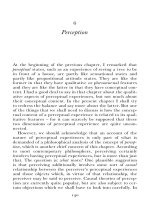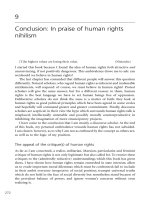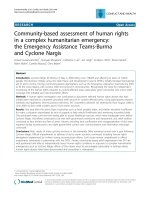PY4652 Course Syllabus - The Philosophy of Human Rights
Bạn đang xem bản rút gọn của tài liệu. Xem và tải ngay bản đầy đủ của tài liệu tại đây (526.79 KB, 6 trang )
University of St Andrews
DEPARTMENT OF PHILOSOPHY
PY 4652, The Philosophy of Human Rights (2016)
Credits: 30
Semester: 2
Description:
The course explores cutting-edge research on the nature, content, and justification of
human rights. We examine the origins of human rights, and current debates about how this
bears on the way in which we should conceive of human rights. We explore contemporary
debates concerning orthodox and political conceptions of human rights; the relationship
between their status as moral and legal norms; the significance of the fact that human
rights are rights; and the nature of human dignity, to which the major human rights
declarations appeal. We also examine critical perspectives on the human rights movement.
Lecturers: Elizabeth Ashford (), and Adam Etinson ()
Learning Outcomes:
By the end of the module, students should have gained a good critical understanding of
core debates in the philosophy of human rights. Students will be able to analyse and
critically evaluate arguments on a range of approaches that have been taken in moral
theorizing about human rights, and to articulate and offer a well-reasoned defence of their
own views on them. To these ends, the requirements of the module are: Attendance at all
classes; a careful reading of the assigned readings, allowing time to critically reflect on the
arguments; preparation for both lectures and seminars; participation in seminar
discussions; and completion of all formal assessment.
Teaching: One 2-hour lecture, and one 1-hour seminar per week starting in week 2
Lecture time: Monday 1-3, Arts Lecture Theatre
Seminars: Thursday 12-1, 1-2, 2-3 (all in Edgecliffe G01). Sign up to a group via the MMS
system.
Office Hours: Elizabeth Ashford, Friday 11-2; Adam Etinson
Assessment: Continuous assessment = 100%: Participation = 10%; argument
reconstruction and analysis exercise (2500 words) = 30%, due Monday 24th Oct (week 7);
final essay (4500 words) = 60%, due Monday 5th Dec (week 13).
1
Seminar aims:
The purpose of seminars is to provide an opportunity for you to raise questions you have
about the lectures and readings in order to make sure you have understood them, and to
discuss the arguments. Studying philosophy is principally about learning to philosophise:
to critically analyse arguments, and offer a reasoned defence of your own views on the
topics under discussion. It is in the seminars that you will actually be doing philosophy.
The more willing you are to try out ideas, the faster you will learn. To benefit properly
from seminars it is essential that you have done the reading in advance, so that you are in a
position to raise questions over what you have found puzzling (remember that in
philosophy, finding arguments puzzling is a sign that you are thinking deeply about them!),
and to participate fully in the discussion. (On the other hand while participation is
important, try not to dominate discussion, so as to allow a real dialogue.) Please bring your
notes from the reading, together with questions about the readings and lectures. We may
call on students at random to ask a question they came prepared with. Students will take it
in turns to give short (5-10 minute max) presentations in the seminars. The class
participation component of the course is a measure of critical engagement in class
discussion; what is important is to do the readings in advance and to start thinking about
the arguments, and what you find puzzling about them and what you find plausible or
implausible.
Content and structure:
Class texts:
James W. Nickel, Making Sense of Human Rights: Second Edition (Oxford: Blackwell
Publishing, 2007.
Philosophical Foundations of Human Rights (Oxford: Oxford University Press, 2015), eds.
S.M. Liao, M. Renzo, & R. Cruft.
Other useful background texts:
Human Rights: Moral or Political? (Oxford: Oxford University Press, Forthcoming), ed.
Adam Etinson.
John Tasioulas and Samantha Besson, eds. The Philosophy of International Law (Oxford:
Oxford University Press, 2010).
Lecture topics and readings:
The following is a provisional list of lecture topics and readings. Some topics will take
more than one lecture.
2
1. History:
•
•
•
James W. Nickel, “The Contemporary Idea of Human Rights”, in, Making Sense of
Human Rights: Second Edition (Oxford: Blackwell Publishing, 2007), Ch. 1, pp. 7-21.
Jenny S. Martinez, “Antislavery Courts and the Dawn of International Human Rights
Law” in Yale Law Journal (2008), Vol. 117, No. 4, pp. 552-579, 629-641.
Samuel Moyn, “Human Rights in History” & “The Intersection with Holocaust
Memory” in Human Rights and the Uses of History (London: Verso Books, 2014), Chs.
5 & 6, pp. 69-87, 87-99.
Further reading:
•
•
•
•
Philip Alston, “Does the Past Matter? On the Origins of Human Rights” in Harvard
Law Review (2013), Vol. 126, No. 7, pp. 2043-2081.
Jenny S. Martinez, “Human Rights and History” in Harvard Law Review (2013), Vol.
126, No. 7, pp. 221-240.
The Universal Declaration of Human Rights (1948) – Available online.
Eleanor Roosevelt, “The Promise of Human Rights” in Foreign Affairs (1947), Vol.
26, No. 3, pp. 470-477.
2. The Nature and Grounds of Human Rights:
•
•
•
James W. Nickel, Making Sense of Human Rights (Oxford: Blackwell, 2007), Chs. 3-5.
James Griffin, “First Steps in an Account of Human Rights” in European Journal of
Philosophy (2001), Vol. 9, No. 3, pp. 306-327.
John Tasioulas, “Human Rights, Universality, and the Values of Personhood” in
European Journal of Philosophy (2002), Vol. 10, No. 1, pp. 79-100.
Further reading:
•
•
•
Simon Caney, Justice Beyond Borders (Oxford: Oxford University Press 2005), Ch. 2,
pp. 25-62,
James Griffin, On Human Rights (Oxford: Oxford University Press, 2008), Chs. 1-2, pp.
1-56.
Amartya Sen, “Elements of a Theory of Human Rights” in Philosophy and Public
Affairs (2004), Vol. 32, No. 4, pp. 315-356.
3. The Orthodox-Political Debate:
•
•
John Rawls, The Law of Peoples (Cambridge: Harvard University Press, 1999), esp.
pp. 59-88.
Joseph Raz, “Human Rights Without Foundations” in The Philosophy of International
Law (Oxford: Oxford University Press, 2010), eds. John Tasioulas and Samantha
3
•
•
Besson, pp. 321-339.
Nickel, James W. (2006), “Are Human Rights Mainly Implemented by Intervention?”
in Rawls’ Law of Peoples: A Realistic Utopia? (Oxford: Blackwell Publishing), eds. Rex
Martin & David Reidy, pp. 263-278.
John Tasioulas, “Are Human Rights Essentially Triggers for Intervention?” in
Philosophy Compass (2009), Vol. 4, No. 6, pp. 938-950.
Further Reading:
•
•
•
•
Jeremy Waldron, “Human Rights: A Critique of the Raz/Rawls Approach” in Human
Rights: Moral or Political? (Oxford: Oxford University Press, Forthcoming), ed. Adam
Etinson.
Joseph Raz, “On Waldron’s Critique of Raz on Human Rights” in Human Rights: Moral
or Political? (Oxford: Oxford University Press, Forthcoming), ed. Adam Etinson.
James Griffin, “Human Rights and the Autonomy of International Law” in The
Philosophy of International Law (Oxford: Oxford University Press, 2010), eds. John
Tasioulas and Samantha Besson, pp. 339-357.
Charles Beitz, The Idea of Human Rights (Oxford: Oxford University Press, 2009), Ch.
5.
4. Methodological Issues I: History and Philosophy
•
•
•
John Tasioulas, “Towards a Philosophy of Human Rights” in Current Legal Problems
(2012), Vol. 65, No. 1, pp. 1-30.
Samuel Moyn, “Human Rights in Heaven” in Human Rights: Moral or Political?
(Oxford: Oxford University Press, Forthcoming), ed. Adam Etinson.
John Tasioulas, “Philosophizing the Real World of Human Rights: A Reply to Samuel
Moyn” in Human Rights: Moral or Political? (Oxford: Oxford University Press,
Forthcoming), ed. Adam Etinson.
Further Reading:
•
Samuel Moyn, “Epilogue: The Future of Human Rights”, in Human Rights and the
Uses of History (London: Verso Books, 2014).
5. Methodological Issues II: Fidelity to the Practice
•
•
James W. Nickel, “Assigning Functions to Human Rights: Methodological Issues in
Human Rights Theory”
Adam Etinson, “On Being Faithful to the ‘Practice’: A Response to Nickel” in Human
Rights: Moral or Political? (Oxford: Oxford University Press, Forthcoming), ed. Adam
Etinson.
4
•
Allen Buchanan & Gopal Sreenivasan, “Taking International Legality Seriously: A
Methodology for Human Rights” in Human Rights: Moral or Political? (Oxford:
Oxford University Press, Forthcoming), ed. Adam Etinson.
Further Reading:
•
John Tasioulas, “Exiting the Hall of Mirrors: Morality and Law in Human Rights”
(DRAFT PAPER – Available online)
6. Human Rights and Human Dignity:
•
•
•
Jeremy Waldron, “Is Dignity the Foundation of Human Rights?” in Philosophical
Foundations of Human Rights (Oxford: Oxford University Press, 2015), eds. S.M. Liao,
M. Renzo, & R. Cruft, Ch. 5, pp. 117-138.
John A. Simmons, “Human Rights, Natural Rights, and Human Dignity” in
Philosophical Foundations of Human Rights (Oxford: Oxford University Press, 2015),
eds. S.M. Liao, M. Renzo, & R. Cruft, Ch. 6, pp. 138-153.
Charles Beitz, “Human Dignity in the Theory of Human Rights: Nothing but a Phrase?”
in Philosophy and Public Affairs (2013), Vol. 41, No. 3, pp. 259-290.
Further Reading:
•
•
David Luban, “Human Rights Pragmatism and Human Dignity”, in Philosophical
Foundations of Human Rights (Oxford: Oxford University Press, 2015), ch 14, pp.
263-278.
Pablo Gilabert, “Human Rights, Human Dignity, and Power”, in Philosophical
Foundations of Human Rights (Oxford: Oxford University Press, 2015), ch 10, pp.
196-213.
7. Critical Perspectives on Human Rights I: Feasibility
•
•
•
Cranston, Maurice, “Are There Any Human Rights?” in Daedalus (1983), Vol. 112, No.
4, pp. 1-17.
Gilabert, Pablo “The Feasibility of Basic Socioeconomic Rights: A Conceptual
Exploration” in Philosophical Quarterly (2009), Vol. 59, No. 273, pp. 659-681.
Elizabeth Ashford, “The Nature of Violations of the Human Right to Subsistence” in
Human Rights: Moral or Political? (Oxford: Oxford University Press, Forthcoming),
ed. Adam Etinson.
Further Reading:
•
Daniel Weinstock, Remarks on Elizabeth Ashford’s “The Nature of Violations of the
Human Right to Subsistence” in Human Rights: Moral or Political? (Oxford: Oxford
5
•
University Press, Forthcoming), ed. Adam Etinson.
James W. Nickel, “Goals and Rights: Working Together?” in The Millennium
Development Goals and Human Rights: Past, Present, and Future (Cambridge:
Cambridge University Press, 20?), eds. M. Langford, A. Sumner, & A. Ely Yamin, Ch. 2,
pp. 37-48.
8. Critical Perspectives on Human Rights II: Claimability
•
•
•
Onora O’Neill, “The Dark Side of Human Rights” in International Affairs (2005), Vol.
81, No. 2, pp. 427-439.
Jeremy Waldron, “Duty-Bearers for Positive Rights” (Working Paper: SSRN,
November 2014)
Adam Etinson, “Human Rights, Claimability, and the Uses of Abstraction” in Utilitas
(2013), Vol. 25, No. 4, pp. 463-486.
Further Reading:
•
•
James W. Nickel, “Human Rights as Rights” in Making Sense of Human Rights: Second
Edition (Oxford: Blackwell Publishing, 2007), Ch. 2, esp. 28-33.
John Tasioulas, “The Moral Reality of Human Rights” in Freedom From Poverty as a
Human Right: Who Owes What to the Very Poor? (Oxford: Oxford University Press,
2007), ed. Thomas Pogge, pp. 75-101.
9. Critical Perspectives on Human Rights III: Framings
•
•
•
Tony Evans, “Universal Human Rights in the Global Political Economy”, in Human
Rights, the Hard Questions, eds Cindy Holder and David Reidy (Cambridge:
Cambridge University Press 2013.
Pablo Gilabert, “Reflections on Human Rights and Power” in Human Rights: Moral or
Political? (Oxford: Oxford University Press, Forthcoming), ed. Adam Etinson.
Eric Posner, The Twilight of Human Rights Law (Oxford: Oxford University Press,
2014), Chs. 3-5, 7, pp. 59-122, 137-149.
6









